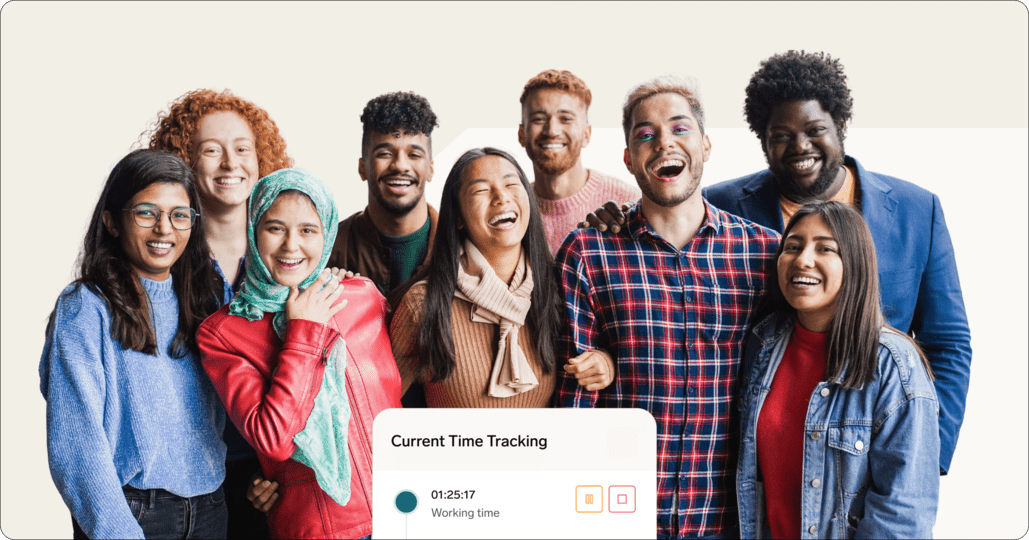205 Startup Statistics: Trends, Rates, Funding, Cost, and Teams
Explore key startup statistics: success rates, funding trends, and industry insights. Get data-driven insights for your entrepreneurial journey.
- 24 Jan 2024
- Max 26 min read
The Number One HR Solution on Salesforce
Generation Z has now outpaced Baby Boomers in the job market and is significantly influencing the future of work. A recent report from Snap and Oxford Economics predicts that Gen Z will soon become a major force in the global workforce. By 2030, the number of Gen Z workers in six key markets is expected to triple to 87 million. As this generation enters the world of work, there will be a greater emphasis on sustainable skills such as agility, curiosity, creativity, critical thinking, and problem-solving. As technology continues to evolve at a rapid pace, universal human capabilities become increasingly important and go beyond specific skill sets and domains. What’s more, these capabilities are in line with the natural strengths of Gen Z and will be essential for success in the rapidly changing job market.
The newest generation to enter the workforce, born between 1997 and 2012, bring a fresh perspective and unique set of values, skills, and expectations to the workplace. Growing up with constant access to technology and social media, Gen Z is highly adaptable and tech-savvy, and values flexibility, collaboration, and meaningful work.
To make the most of their potential, employers must be mindful of their preferences and skills. By prioritizing mental health, offering growth opportunities, and recognizing their global perspectives, organizations can attract and retain top Gen Z talent. As we welcome this new generation into the workforce, understanding their impact and expectations is crucial for creating a productive and inclusive work environment.
Generation Z, or Gen Z, refers to the generational cohort born between 1997 and 2012. As they have started to enter the workforce, they are bringing unique perspectives and expectations with them, presenting new challenges and opportunities for employers and employees alike.
The genesis of Gen Z's outlook and values can be traced back to the economic climate during their formative years. Growing up amidst the Great Recession, they witnessed firsthand the financial struggles endured by older generations due to the harsh economic downturn. This experience has taught these younger workers valuable lessons and shaped their approach to work-life balance, making them more pragmatic and risk-averse compared to previous generations.
In the workplace, Gen Z individuals exhibit a strong desire for purpose and fulfillment. They are driven by the need to make a positive impact in their organizations and society as a whole. They also value corporate social responsibility (CSR) and the connection between their work and ethical considerations. Recent research reveals that while many American workers prioritize working for companies that demonstrate social and environmental values, this is especially true for Gen Z job seekers and workers. In fact, the Bentley-Gallup Force for Good Study found that 71% of survey respondents aged 18-29 expressed a willingness to leave their current employer in favor of one that creates a more positive social impact. In comparison, only 62% of respondents aged 30-44 and 55% of all respondents shared this view. Moreover, a recent survey conducted by Deloitte on the mindset of Gen Z and millennials found that almost 40% of respondents turned down a job or assignment because it conflicted with their personal values. On the other hand, those who are content with their employers’ corporate social responsibility efforts were more inclined to stay with the organization for over five years.
It is evident, then, that cultivating a robust CSR strategy and instilling strong company values should be a top priority when it comes to unlocking the potential of your young employees and ensuring their job satisfaction.
Gen Z employees also place great importance on work-life balance, and thrive in flexible environments that allow them to integrate work, personal interests, and socializing more seamlessly. Indeed, the Deloitte survey found that 75% of Gen Z respondents prioritize job flexibility over a higher salary. This preference is not unexpected, as Gen Z is the first generation to grow up fully immersed in the digital age and they value the ability to work from any location at any time. Employers who provide flexible work arrangements are better positioned to attract and retain the best Gen Z talent.
As Generation Z emerges into the workplace, it is crucial for employers to adapt to their preferences and expectations. Understanding the factors that shaped this generation, such as the Great Recession, political uncertainty, an increasingly globalized world, and the climate crisis, will provide valuable insights for designing a workplace that fosters engagement and innovation among its diverse workforce.

Generation Z, born between the mid-1990s to early 2010s, differs significantly from their predecessors, the millennials (Generation Y), who were born between 1981 and 1996. While both generations are tech-savvy, Gen Z has grown up entirely in the digital age, making them true digital natives. Millennials may have experienced the introduction and growth of technology, but Gen Z has had access to advanced technology from birth.
Generation X, born between 1965-1980, has been known for their independent and entrepreneurial mindset in the workplace. Though sharing some common values with Generation Z, such as the desire for work-life balance and adaptability, Gen X tends to be more individualistic in their career approach.
Gen Z, however, is highly collaborative and inclined to work in teams. They embrace inclusivity and value diverse perspectives, with many of them actively seeking ways to contribute to making the world a better place. According to a study by Zety, 43% of Gen Z members hope to make a positive global impact.
Baby Boomers, born between 1946-1964, have a much different approach to work than Generation Z. Boomers were raised in a post-war era where long-term employment and traditional roles were the norm. This generation believes in stable, secure careers and tends to value hard work and perseverance in the workplace.
Gen Z, on the other hand, enters the workforce in a rapidly changing and globally connected world. They are more likely to seek flexibility and prioritize adaptability and creativity in their careers. Moreover, Gen Z is the most diverse generation ever, not only in terms of race and gender but also in regard to identity and orientation. As a result, companies that can effectively showcase the full spectrum of differences in their external branding and marketing are more likely to attract diverse talent and expand their talent pipelines.
The takeaway here is that each generation brings its unique strengths and perspectives to the workplace. Understanding and embracing these differences can lead to a more effective and cooperative work environment, benefiting everyone involved.
Gen Z values work-life balance and is increasingly prioritizing it when choosing their careers and employers. They seek a healthy equilibrium between their professional and personal lives, a goal that may be partly driven by witnessing the stress and burnout experienced by previous generations. Employers looking to attract Gen Z talent should demonstrate their commitment to supporting a balanced lifestyle through policies, benefits, and company culture.
Generation Z workers appreciate flexibility in their careers, especially when it comes to work arrangements and schedules. According to a recent survey conducted by TalentLMS, 81% of Gen Z workers consider the ability to choose their work schedule and location to be critical, with the majority preferring a hybrid work model that combines remote and in-office work.
The rise of flexible work models appeals to their desire for autonomy and personalization in the workplace. However, they are also concerned about job security and long-term stability. A 2022 study by McKinsey found that nearly half (45%) of Gen Z individuals express concerns about the stability of their employment. To meet these expectations, employers should balance the need for flexible work options with opportunities for career development and job certainty.
While [salary is definitely a consideration](https://finance.yahoo.com/news/heres-average-salary-generation-says-140000949.html#:~:text=Gen Z says they require,conducted by The Harris Poll.) for Gen Z in selecting a job, they also place a high value on pursuing their passions and finding meaningful work. They are more likely to accept a job that aligns with their interests even if it offers a lower salary. To attract and retain young workers, organizations should emphasize their mission, values, and the positive impact of their work to resonate with this generation's desire for purpose-driven careers.
In an interview with Washington Post, Julie Lee, director of technology and mental health at Harvard Alumni for Mental Health and an expert on Gen Z health and employment, summed up the work expectations of young people today:
“What Gen Z wants is to do meaningful work with a sense of autonomy and flexibility and work-life balance and work with people who work collaboratively.”
Gen Z is the most tech-savvy generation so far, having grown up in a world of rapid technological advancement. They are highly proficient with modern tools and resources and have a natural ability to adapt to and embrace new technologies. This is evident in the widespread popularity of platforms like TikTok, which has transformed marketing and commerce and is dominated by this demographic.
The result is that Gen Z workers are adept at embracing new technologies to increase efficiency and productivity in the workplace. They exhibit an advanced understanding of the internet, which allows them to use different online platforms to quickly access relevant information and communicate effectively with their peers. In fact, according to Deloitte, Gen Z is set to revolutionize the workforce with its impressive technology skills. As AI continues to gain momentum, these younger workers are expected to be the most adept at mastering these cutting-edge technologies.
Gen Z is known for their entrepreneurial mindset, with many individuals eager to start their own businesses. In fact, a recent survey conducted by ZenBusiness revealed that a whopping 75 percent of Gen Z respondents expressed a desire to pursue careers as entrepreneurs. Many members of this generation are self-starters who prefer to forge their own career paths, and they are not shy about taking risks to achieve success.
They value autonomy and independence in their work but are mistrustful of authority. Micromanaging and strict rules are out – the focus is on results! This entrepreneurial mindset contributes to their potential for driving innovation and finding new opportunities in the ever-evolving job market.
Gen Z is a generation that brings a unique blend of collaboration, communication, and leadership skills to the table. Having grown up in a world where social media and technology are ubiquitous, they are highly skilled at working in teams and collaborating with others, whether it be in-person or virtually.
A recent survey conducted by consulting firm GenGuru found that 84% of Gen Z individuals still prefer in-person communication over email or text – surprising? Well, it is worth noting that this generation has a unique definition of what "face-to-face" communication means. In fact, they consider video conferencing tools like Zoom, Google Hangouts, and Microsoft Teams to be a form of face-to-face communication.
When it comes to leadership, Gen Z individuals tend to value a more democratic approach, seeking input from all team members and striving for consensus before making decisions. They are also highly adaptable and open to change, making them well-suited to lead teams through times of transition and uncertainty.
Gen Z's unique combination of skills and values makes them a force to be reckoned with in the modern workforce. They bring a fresh perspective and a willingness to embrace change, making them invaluable assets to any team.

Gen Z is a generation that values diversity and inclusion, both in society and in the workplace. According to a Pew Research study, 62% of Gen Zers believe that increased diversity is good for society. This sentiment is reflected in their purchasing decisions as well. In fact, nearly 80% of Gen Z respondents, as per a survey by Quantilope, consider it important for brands to address diversity and inclusion.
But Gen Z's expectations go beyond mere representation and DEI efforts. They recognize that true change can only be brought about by a diverse leadership team. As the same Quantilope survey found, more than half (53%) of Gen Zers want to see more diversity in senior leadership positions. This highlights their belief that diversity in leadership is a key factor in driving meaningful progress and creating a more equitable workplace.
Gen Z employees are keenly aware of the impact that businesses have on society and the environment. They prioritize corporate social responsibility (CSR) and evaluate potential employers based on their alignment with ethical principles and commitment to the greater good. Companies that invest in CSR initiatives, such as community development programs and philanthropy, are more likely to attract and retain Gen Z workers. Additionally, organizations that promote transparency in their operations and decision-making processes are viewed more favorably by this generation.
Climate change and sustainability concerns are significant factors in shaping Gen Z's work culture and ethics. Gen Z is a generation that is passionate about sustainability and environmental responsibility. According to Bupa's latest Wellbeing Index, a significant majority (66%) of Gen Z workers would be willing to accept a lower salary to work for an ethical or environmentally-conscious organization. This demonstrates their commitment to making a positive impact and aligning their values with their work.
Moreover, over half (56%) of Gen Z staff stated that presenting sustainable and eco-friendly initiatives to their organization's leadership, and seeing them implemented, would increase their motivation at work and drive productivity, loyalty, and talent retention. This highlights their desire to work for companies that prioritize sustainability and are willing to take bold steps to address environmental issues.
Gen Z individuals tend to be drawn to eco-friendly startups and innovators that challenge traditional practices. They believe in working for organizations that are committed to making a difference and are not content with maintaining the status quo. This underscores the importance of sustainability in attracting and retaining top talent from this generation, and highlights the role that businesses can play in driving positive change.
Gen Z workers are facing significant mental health challenges in the workplace. A survey by McKinsey & Company found that they reported remarkably high rates of mental health struggles, with 55% of 18- to 24-year-olds indicating they have received a diagnosis or treatment for mental health issues. These challenges are further exacerbated by the relatively low perceived affordability of mental health services, as one in four Gen Z respondents stated they could not afford such services.
A common issue young employees face is burnout, which is often the result of an imbalance between workload, expectations, and the ability to cope with stress. This can manifest as emotional exhaustion, lack of motivation, and decreased job satisfaction, negatively impacting their overall wellbeing and productivity.
To foster a healthy work environment, employers should prioritize flexibility and work-life balance. A Washington Post article notes that Gen Z’s demands include flexible work arrangements and wellness perks, such as gyms and mental health resources. Providing employees with the opportunity to work remotely or choose their hours can help reduce stress and encourage a better balance between work and personal life.
Additionally, 66% of Gen Z wants a company culture focused on mental health and wellness. Employers can demonstrate their commitment to employee well-being by providing access to mental health services, offering resources for stress management and self-care, and fostering a positive and inclusive workplace culture.
Addressing the mental health and wellness needs of Gen Z workers is essential for their success and overall satisfaction in the workplace. By understanding their unique challenges, offering flexibility, and prioritizing mental health, you can help your Gen Z employees thrive and contribute significantly to the company's growth and success.
Gen Z is a generation that is not afraid to stand up for what they believe in, particularly when it comes to workplace equality and fair treatment. In the wake of the COVID-19 pandemic, they have shown a growing interest in labor movements and trade unions as a means of achieving these goals.
What sets Gen Z apart is their unique approach to collective action. While they recognize the power of traditional unions, they are also likely to support grassroots movements and digital activism as a means of effecting change. Gen Z workers are using platforms like TikTok to educate the public and each other about disputes and organized labor movements. They are also more likely to prioritize workplace culture and values and are willing to support companies that align with their beliefs.
In fact, a survey by the Center for American Progress found that Gen Z is the most pro-union generation alive, with a mean union approval rating of 75%. This reflects their desire for social and economic justice, as well as their belief in the importance of collective action to achieve these goals.
With their focus on social and ethical issues, Generation Z is driving meaningful change in workplace culture. As they continue to enter the workforce, their influence will undoubtedly challenge organizations to adapt and evolve in response to their values and expectations.

Now that we have a better understanding of Gen Z's values and priorities, it is important to consider how your organization can attract and retain top talent from this demographic.
Employers looking to attract and retain Gen Z talent should focus on offering meaningful rewards and benefits tailored to their needs and preferences. This generation values a healthy work-life balance and flexibility in their schedules. Offering a competitive salary, along with additional incentives such as remote work options, flexible hours, and a generous time-off policy, can help in attracting Gen Z employees to the organization.
Gen Z employees place a high value on personal and professional growth. As a result, employers should invest in comprehensive workforce training programs to help their Gen Z staff develop the skills they require to stay competitive in the market. Offer a variety of training formats, such as in-person workshops, e-learning courses, and mentorship opportunities. Trainings should be designed to encourage continuous learning and cover not only the necessary technical skills but also soft skills like communication, problem-solving, and adaptability.
Building a strong relationship based on trust and open communication is crucial for engaging and retaining Gen Z talent. Employers should establish a culture that encourages regular feedback, both from management and among peers. Implementing regular performance reviews focused on setting goals, identifying areas of improvement, and celebrating achievements can help foster trust and open communication in the workplace.
Businesses can also benefit from embracing new approaches to collective action. Companies that are willing to listen to their employees and work collaboratively to address workplace concerns are more likely to earn the loyalty and dedication of Gen Z workers.
Last but not least, Gen Z individuals place a high value on workplace equality, fair treatment, and social justice. They are looking for companies that prioritize diversity and inclusion and that are willing to take a stand on important social issues. Gen Z is passionate about making a positive impact on the world and is drawn to companies that share this commitment, favoring employers who prioritize environmental sustainability and support community initiatives. By promoting their company's positive impact on people and the planet, employers can strike a chord with Gen Z candidates to attract the best and brightest talent, and boost employee engagement.

Generation Z is a driving force of change in organizations as they enter the workforce. As a tech-savvy generation, Gen Z has the potential to transform and disrupt the workplace more than any other generation. Organizations must adapt to meet the emerging needs of Gen Z employees, who often have different expectations and values than previous generations.
Fortunately, Gen Z's focus on mental health and well-being is driving positive changes in workplace culture. Many organizations are reevaluating their policies and benefits to better support employees and promote a healthier work-life balance. Additionally, Gen Z's strong digital skills are pushing organizations to implement new technologies and innovative solutions to improve processes, communication, and overall efficiency.
Moreover, Gen Z's consciousness of social and environmental issues is driving a desire to work for organizations that align with their values and promote sustainability. Employers that demonstrate a commitment to social responsibility, inclusivity, and environmental stewardship can enhance their appeal to younger workers and attract the best talent from this emerging generation.
The arrival of Generation Z in the workplace is an exciting opportunity for driving organizational change and exerting social and political influence. Adapting to these influences is crucial for organizations to remain competitive and attract the best talent from this emerging generation. By embracing Gen Z's values and priorities, businesses can create a more inclusive, sustainable, and innovative workplace that benefits everyone.
flair is committed to building a better future of work for everyone. To find out how it can help you build world-class company culture and streamline your HR processes, book a demo today!
Join flair’s newsletter to receive the latest tips & trends in the HR world.

